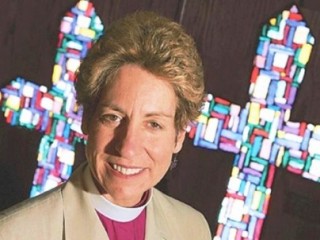
Katharine Jefferts Schori biography
Date of birth : 1954-03-26
Date of death : -
Birthplace : Pensacola, Florida, U.S.
Nationality : American
Category : Politics
Last modified : 2011-09-13
Credited as : Bishop, Episcopal Church of the United States,
0 votes so far
Born in Pensacola, Florida, in 1954, Jefferts Schori grew up in Seattle, Washington, and New Jersey. Both parents were exceptionally gifted: Her father was an atomic physicist who became an astrophysicist, while her mother had earned a literature degree but later had a career as a microbiologist. As a child, Jefferts Schori attended the parochial schools run by the local Roman Catholic dioceses where she lived, but around the age of nine her parents left that faith and began attending services at an Episcopalian church. "We went from a liturgy in Latin to one in English," she recalled in an interview with New York Times journalist Neela Banerjee, "from a large and anonymous church to a small and intimate one."
Jefferts Schori was inactive in either faith as a young adult, however. She attended Stanford University, where she earned her undergraduate degree in biol- ogy in 1974, and went on to Oregon State University, which granted her a master's degree in 1977 and then a Ph.D. in oceanography six years later. Her specialty was the northern Pacific Ocean species of squids and octopuses, and for many years she worked as an oceanographer with the National Marine Fisheries Service out of its Seattle office. She was also an accomplished pilot, but when a friend died in a plane crash, she returned to the Episcopalian church once more in her grief. Friends she made in her congregation encouraged her to pursue the priesthood, but she hesitated for a number of years before entering one of the seminaries of the Episcopal Church of the United States in Berkeley, California. She graduated from the Church Divinity School of the Pacific in 1994, and was ordained a deacon and priest that same year.
Career posts for Jefferts Schori in her new calling included serving as assistant rector at the Episcopal Church of the Good Samaritan in Corvallis, Oregon, and as dean of the attached Good Samaritan School of Theology. In February of 2001, she was consecrated the ninth bishop of Nevada, a 6,000-member diocese. She had reached the rank of bishop in a church that had, since the 1970s, emerged as a leader in granting equal rights to its female members. The Episcopal Church of the United States was the first mainstream religious faith in the modern age to permit women to join the ranks of the priesthood, which it did in 1976. In the interim years, however, an ideological split grew within the worldwide Anglican Communion. With 77 million adherents around the world, the Anglican Communion housed a diverse array of practitioners, and more conservative elements within it objected to the elevation of women as bishops; in Britain, for example, the Church of England spiritual cousin of the American Episcopalians was still divided on the issue.
Gay rights was also a divisive subject in the Anglican Communion. Bishops in Africa and other parts of the world were much less tolerant on the issue of women and gay priests as their equals in the religious community. Some Southern U.S. Episcopal parishes strongly objected to the elevation of V. Gene Robinson of New Hampshire as the church's first openly gay bishop in 2003. Jefferts Schori, who was one of the bishops who voted in support of Robinson, believed that gay members of the Episcopal Church were entitled to all the same rights as heterosexuals. As bishop of Nevada, she made a somewhat daring decision to allow priests in her diocese the right to bless same-sex unions.
The Episcopal Church of the United States chooses a new Presiding Bishop every nine years. In June of 2006, at the General Convention in Columbus, Ohio, Jefferts Schori was elected to become the next leader of the Episcopal Church. Of the seven candidates, she was the only woman, and news of her win ignited a maelstrom of controversy within the Church. Days later, one Texas congregation voted to leave the denomination, while several others petitioned the head of the worldwide Anglican Communion, Archbishop of Canterbury Rowan Williams, to transfer their oversight from the American church to his supervision as leader of the Church of England. At the time, Williams was contending with a potentially larger split within the Anglican Communion, and soon afterward proposed a compromise: Either U.S. bishops would renounce the elevation of gay priests to the bishop level and cease blessing same-sex unions, or agree to give up their full-membership status in the Anglican Communion. Jefferts Schori's election in Columbus was viewed as a sign that there was strong support among American Episcopal Church adherents for tolerance on the gay rights issue.
Jefferts Schori's consecration was scheduled for November 1, 2006, at Washington's National Cathedral. In attendance would be her husband, Richard Schori, a retired theoretical mathematician, and daughter Katharine Johanna, an Air Force pilot and lieutenant. Well-versed in scripture and theological topics, Jefferts Schori dismissed the fracas over her election as head of the Episcopal Church in an interview with Stephen Bates of London's Guardian newspaper. "I think it is the Evil One who is at work here, distracting us from our central focus, which ought to be on feeding the hungry, relieving the needs of the poor, healing the sick," she said. "This obsession is keeping us from doing that. To focus on issues of sexuality when people are dying is a distraction from our mission."
















